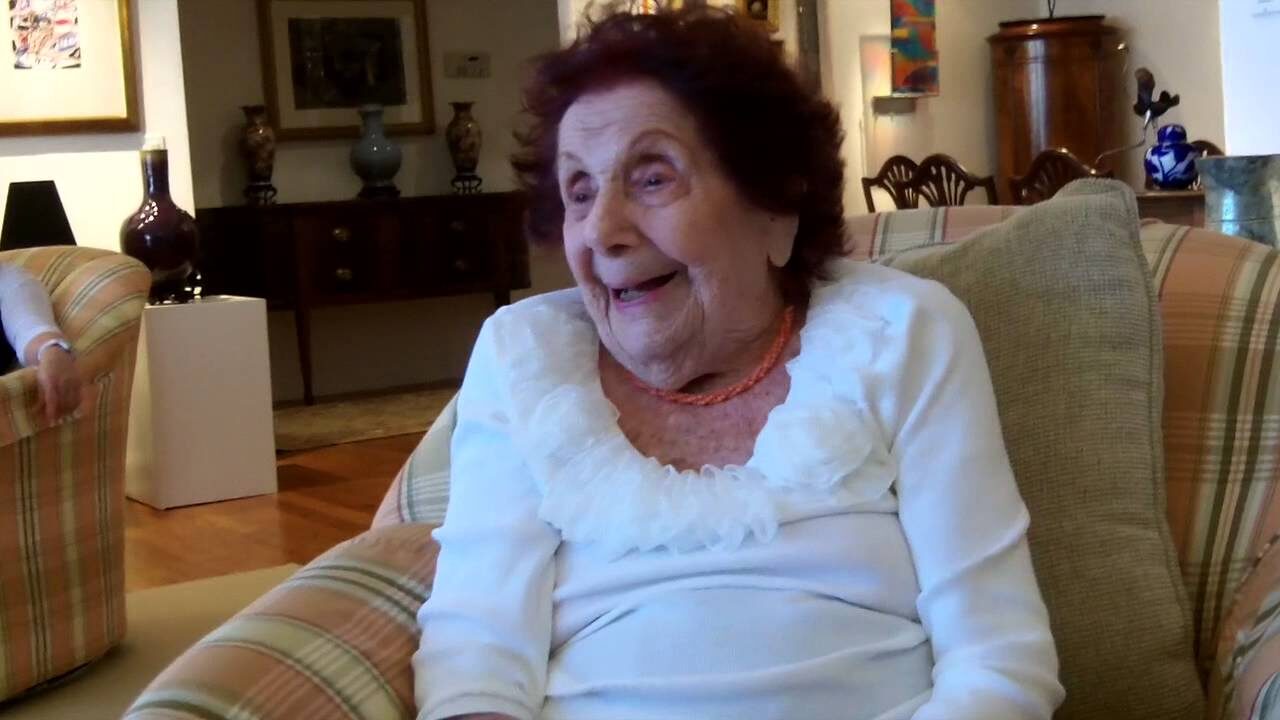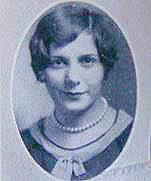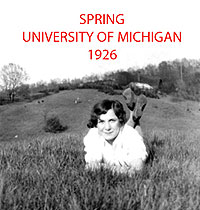The stuff of college memory
Prohibition. The Jazz Age. Flappers. For most of us, the terms evoke an era that lives only in vintage film footage and black-and-white prints. For Lillian (Cooper) Gaines, ABEd ’27/TeachCert ’27, they are the stuff of college memory.
“I was a dancing fool,” says Gaines, who, at age 106, could be the University of Michigan’s oldest living graduate. She was just 16 when she arrived on campus, a most unlikely candidate for a college education.
“Did my grandparents encourage my mother to come to Michigan?” asks Lillian’s son, Harry Gaines, AB ’57/JD ’60. “I can’t say for sure. They may indeed have wanted her to go to college. However, back then, this was something most women just didn’t do. And as a practical matter, my grandparents wouldn’t have had the money.”
Lillian’s father, Sam Cooper, had fled Russia, hiding on a coal boat to avoid conscription in the Czar’s army. Once in America, he lived out “a classic Fiddler on the Roof story,” Harry says. “He was a peddler, and he regularly peddled with his horse and buggy all the way from Detroit to Port Huron,” selling and bartering along the way. Later, Sam and his wife, Hattie, would own and run a busy dry goods store on Detroit’s Gratiot Avenue.
A class of her own
When her older brother, Harold Henry Cooper, AB ’27, enrolled at Michigan, Lillian defied convention and left Detroit to pursue her own education in Ann Arbor. She’d hoped to join a sorority like her well-to-do cousins. After all, “down in her innermost soul, every girl who comes to college cherishes the hope that she will be a sorority girl,” according to the book Advice to Freshmen by Freshmen, written for the incoming class in 1921.
For Lillian, though, it was not to be. “I couldn’t join because my father was poor,” she says. “We didn’t have money for anything.” Lillian made her own clothes and paid for college by working summers at Hudson’s department store.
After graduation she pursued a teaching career, earning a salary in the Detroit public schools. She got married and began raising her children in Saginaw, establishing a small Sunday school program at a temple there. In 1942 Lillian became president of the American Association of University Women in Saginaw, and during World War II, she volunteered in the American Red Cross Motor Corps. In 1959 she was named president of the local branch of the National Council of Jewish Women.
Things change
Some 30 years after receiving her diploma, Lillian would see her son, Harry, experience Michigan in far different times—and circumstances. While mother came of age during the Roaring ’20s when girls wore bobbed hair and drop-waist dresses, son experienced Michigan in its post-World War II incarnation. It was the straight-laced ’50s, a period of relative calm and prosperity.
Unlike his mother, Harry came to school bearing a proud family name and the benefits that came with it. Lillian had married Lionel Ginsburg in a formal wedding (at her parents’ insistence) after the couple eloped to Mexico. Her husband attended Michigan for a couple of years before graduating from Drake School of Law in Chicago. He was the nephew of I.S. Ginsburg, who founded the Saginaw Furniture Shops in 1923.
While his uncle and cousins oversaw the furniture company’s headquarters and showrooms in Chicago and New York, Lionel, straight out of law school, ran the Saginaw factory, growing it into the city’s second largest employer after General Motors. There, he worked with European artisans and regularly traveled to South America to source wood. For newlywed couples of a certain social standing in the ’30s, the Saginaw Furniture Shops’ dining and bedroom sets were highly prized wedding gifts, and the family business prospered.
Along the way, Lionel changed his family name to Gaines, on a cue from his uncle. “At a certain point in the ’30s, it wasn’t good business to be recognized as Jewish,” Harry says.
During World War II, the U.S. government pressed the furniture factory into service to fashion less exquisite fare: wartime truck beds. And after World War II, Lionel retired early and moved Lillian and their two children, Janice and Harry, to Jacksonville, Fla.
Mother and child reunion
When it was time for college, daughter Janice graduated from the University of Florida after stints at U-M and the University of Geneva in Switzerland. Harry began by attending the University of Florida, but after his first year, he decided to make a change. Imagine Lillian’s delight when he applied to three alternate schools, including her alma mater. “The minute I stepped foot on that campus, I said, ‘Mother, we don’t need to go any further.'” Harry knew he was home.
In contrast to Lillian, Janice and Harry could afford to participate in Greek life in college: Janice at Sigma Delta Tau and Harry at Zeta Beta Tau (ZBT). “When you walked into the ZBT house, they were playing classical music,” Harry says. “And when we sat down to dinner, many of our discussions were academic discussions.”
The fraternity disbanded on campus in 2010, but the friendships have lasted a lifetime. “The guys I met at the ZBT house are probably the finest group of men that I’ve ever known in my life,” Harry says. To this day, he and his brothers from the class of 1957 get together every two years.
Post-graduation, “I walked across the street [from LSA] to the Law School, for another three years,” Harry says. While a law student, he was responsible for escorting dignitaries around campus and hosting them in the Law School’s elegant dining hall. His guests would include former First Lady Eleanor Roosevelt, renowned advice columnist Esther Pauline (“Eppie”) Friedman Lederer (better known as Ann Landers), British Commander General of the Arab Foreign Legion Sir John Bagot Glubb (aka Pasha Glubb), and Polish-born American violinist and conductor Isaac Stern.
After law school, Harry served as an assistant state’s attorney in Florida for several years before opening his own practice. He retired in 1999. If it weren’t for the Michigan winters, Harry says, he’d move back to Ann Arbor in a heartbeat. His sister, Janice, lives in Israel.
Lillian now lives in Miami, where she sees Harry regularly. She’s still singing the old songs, like “I Want to Go Back to Michigan.” It memorializes such bygone locales as Joe Parker’s Saloon, which anchored the Catalpa Inn in downtown Ann Arbor, and the Orient, a nearby club for men.
Those original landmarks may have disappeared, but Lillian’s spirit remains vital and ever-present as she breaks into song: “I wanna go back / I gotta go back / to Mi-chi-gan!” she sings, sounding like a proud alumna, 106 years young.
Tell us about “your” Michigan in the comments section.








Carolyn Levin - 1953
Wow! What a wonderful story, what a remarkable person.
Reply
Marjorie Korenblit - 1965
What a woman! What spirit! My father was in the class of 1930. I wish he were here to read about Lillian. He chose to go to Michigan because it was one of the few universities in those years that openly accepted Jewish students to their medical school. Sadly, economic problems prevented him from graduating from Michigan, but he had great pride in the fact that both I and my brother did.
Reply
Jane Dean Zimmerman - 1962
My mother, Clara Marti Dean Cartwright, also started at UM when she was 16, and graduated in 1930. With a Saginaw connection, they must have been friends. Great story. Best wishes, Lillian!
Reply
Julie Miller Johnson
Coincidences always fascinate me!! I am the 3rd generation of women in my family to graduate from the UM School of Nursing. My grandmother, Emma Seitz Miller in 1917, my aunt Marie Miller Patton in 1944 and me in 1970. One of my nieces also graduated from UM, but not in nursing. All of us were born in Saginaw. My maternal grandfather. Julius C Heyn, was a well-known business man in Saginaw during the 30s and 40s. I moved to Gainesville,FL (home of the Univ of Fla) in 1991 because of the Michigan winters and stayed.
The education we received in Ann Arbor is priceless. It has proven to be a strong, stable base for career, family, life. Our gratitude.
Reply
Stephen Whitfield
My brother and I called her “Aunt Lillian.” Her husband was “Uncle Lionel.” They were our parents’ closest friends in Jacksonville, Florida; and I cherish the memories of Passover seders and many other times together. Lillian and Lionel had a tv set before our family did. They were generous and gracious, and I enjoyed listening to the adult conversation when they were around. The first time I ever encountered an institution of higher learning was at the University of Michigan, at its law school, when Harry Gaines was enrolled there and I stayed in his dorm room at Ann Arbor. I will never forget the class I sat in on. It was huge; the seats were banked. There was exactly one woman in the class, and she was teased mercilessly. Harry was a great host, and decades later, in Miami, in the final phase of Aunt Lillian’s preposterously long life Harry could not have been a more loyal, helpful and loving son.
Reply
Bob Spector
I’m glad I stumbled on this old article. I.S. Gaines (ne Ginsburg) was my great-grandfather. My maternal grandfather was one of his sons, A.J. Gaines.
Reply